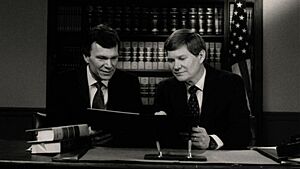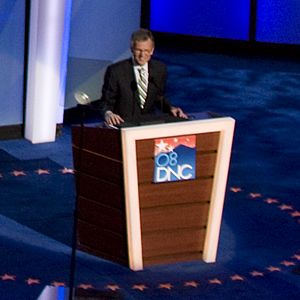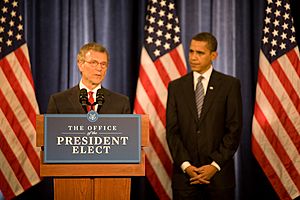Tom Daschle facts for kids
Quick facts for kids
Tom Daschle
|
|||||||||||||||||||||||||||||||||||||||||||||||||||||||||||
|---|---|---|---|---|---|---|---|---|---|---|---|---|---|---|---|---|---|---|---|---|---|---|---|---|---|---|---|---|---|---|---|---|---|---|---|---|---|---|---|---|---|---|---|---|---|---|---|---|---|---|---|---|---|---|---|---|---|---|---|
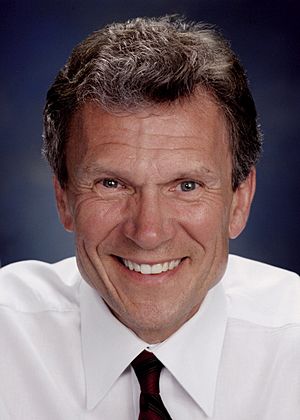
Official portrait, 2003
|
|||||||||||||||||||||||||||||||||||||||||||||||||||||||||||
| United States Senator from South Dakota |
|||||||||||||||||||||||||||||||||||||||||||||||||||||||||||
| In office January 3, 1987 – January 3, 2005 |
|||||||||||||||||||||||||||||||||||||||||||||||||||||||||||
| Preceded by | James Abdnor | ||||||||||||||||||||||||||||||||||||||||||||||||||||||||||
| Succeeded by | John Thune | ||||||||||||||||||||||||||||||||||||||||||||||||||||||||||
|
|||||||||||||||||||||||||||||||||||||||||||||||||||||||||||
| Member of the U.S. House of Representatives from South Dakota |
|||||||||||||||||||||||||||||||||||||||||||||||||||||||||||
| In office January 3, 1979 – January 3, 1987 |
|||||||||||||||||||||||||||||||||||||||||||||||||||||||||||
| Preceded by | Larry Pressler | ||||||||||||||||||||||||||||||||||||||||||||||||||||||||||
| Succeeded by | Tim Johnson | ||||||||||||||||||||||||||||||||||||||||||||||||||||||||||
| Constituency | 1st district (1979–1983) At-large district (1983–1987) |
||||||||||||||||||||||||||||||||||||||||||||||||||||||||||
| Personal details | |||||||||||||||||||||||||||||||||||||||||||||||||||||||||||
| Born |
Thomas Andrew Daschle
December 9, 1947 Aberdeen, South Dakota, U.S. |
||||||||||||||||||||||||||||||||||||||||||||||||||||||||||
| Political party | Democratic | ||||||||||||||||||||||||||||||||||||||||||||||||||||||||||
| Spouses |
Laurie Fulton
(m. 1969; div. 1983)Linda Hall
(m. 1984) |
||||||||||||||||||||||||||||||||||||||||||||||||||||||||||
| Children | 3, including Nathan | ||||||||||||||||||||||||||||||||||||||||||||||||||||||||||
| Education | South Dakota State University (BA) | ||||||||||||||||||||||||||||||||||||||||||||||||||||||||||
| Military service | |||||||||||||||||||||||||||||||||||||||||||||||||||||||||||
| Allegiance | United States | ||||||||||||||||||||||||||||||||||||||||||||||||||||||||||
| Branch/service | United States Air Force | ||||||||||||||||||||||||||||||||||||||||||||||||||||||||||
| Years of service | 1969–1972 | ||||||||||||||||||||||||||||||||||||||||||||||||||||||||||
| Unit | Strategic Air Command | ||||||||||||||||||||||||||||||||||||||||||||||||||||||||||
| Battles/wars | Vietnam War | ||||||||||||||||||||||||||||||||||||||||||||||||||||||||||
Thomas Andrew Daschle (born December 9, 1947) is an American politician who served as a U.S. Senator for South Dakota from 1987 to 2005. As a member of the Democratic Party, he became a very important leader. For ten years, he led the Democrats in the Senate, serving as both Minority Leader and Majority Leader.
After serving in the United States Air Force, Daschle was elected to the United States House of Representatives in 1978. He served there for four terms before being elected to the U.S. Senate in 1986. His leadership roles in the Senate made him one of the most powerful politicians in the country.
In 2004, he lost his Senate seat in a very close election to John Thune. After leaving politics, Daschle became a policy advisor for a law and lobbying firm. He also worked with the Center for American Progress and wrote a book about making health care available to all Americans.
Daschle was a strong supporter of Barack Obama's run for president. After Obama won in 2008, he nominated Daschle to be the Secretary of Health and Human Services. However, Daschle withdrew his name after a controversy about his taxes. Today, he works for a public policy group called The Daschle Group.
Contents
Early Life and Education
Tom Daschle was born in Aberdeen, South Dakota. He grew up in a working-class family and was the oldest of four brothers. His grandparents on his father's side were Volga Germans, who were Germans that had settled in Russia.
He went to Central High School in Aberdeen. In 1969, he became the first person in his family to graduate from college, earning a degree in political science from South Dakota State University.
After college, from 1969 to 1972, Daschle served in the United States Air Force. He worked as an intelligence officer for the Strategic Air Command. In the mid-1970s, he began his career in politics as an aide to Senator James Abourezk.
A Career in Washington, D.C.
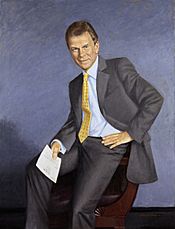
In 1978, at age 31, Daschle was elected to the United States House of Representatives. The election was incredibly close—he won by only 139 votes after a recount. He served four terms in the House and became a leader within the Democratic Party.
Serving in the U.S. Senate
In 1986, Daschle won a close election to become a U.S. Senator for South Dakota. He quickly became an important voice in the Senate.
What is a Party Leader?
In 1994, his fellow Democratic senators chose him to be their leader. This role is called the Minority Leader when your party has fewer than 50 seats, and the Majority Leader when your party has more. The leader helps set the party's goals and speaks for them on major issues.
The Senate was perfectly split for a while in 2001, with 50 Democrats and 50 Republicans. For 17 days, Daschle was the Majority Leader because Vice President Al Gore, a Democrat, could cast the tie-breaking vote. When George W. Bush became president, his Republican Vice President Dick Cheney gave the Republicans the majority, and Daschle became Minority Leader again.
Later that year, a Republican senator named Jim Jeffords decided to become an independent and vote with the Democrats. This switched control of the Senate again, and Daschle was once more the Majority Leader until 2003.
2001 Anthrax Attack
In October 2001, just after the 9/11 attacks, a letter containing anthrax powder was sent to Daschle's office. Anthrax is a dangerous bacteria that can make people very sick. This was part of a series of attacks through the mail. Some of his staff members were exposed to it, but thankfully, they recovered. His office had to be specially cleaned to make it safe again.
2004 Reelection Campaign
In 2004, Daschle ran for reelection to the Senate. His opponent was Republican John Thune. The race was very competitive. Other major Republican leaders, including President George W. Bush and Senate Majority Leader Bill Frist, came to South Dakota to campaign against Daschle.
They said Daschle was blocking the president's plans. The election was one of the closest in the country that year. In the end, Thune won by a small margin of about 4,500 votes. It was the first time in over 50 years that a Senate party leader had lost their seat in an election.
Life After the Senate
After leaving the Senate, Daschle did not leave public life. He became a "special policy adviser" for a law firm in Washington, D.C. This meant he used his knowledge of government to help companies understand laws, especially in the healthcare industry.
He also worked with several non-profit groups. He co-founded the Bipartisan Policy Center with other former senators like Bob Dole and George Mitchell. The center's goal is to get Democrats and Republicans to work together to solve problems.
Supporting Barack Obama
Daschle was one of the first major political figures to support Barack Obama when he decided to run for president in 2008. He served as a key advisor during Obama's campaign.
After Obama was elected president, he chose Daschle to be his Secretary of Health and Human Services. This person is in charge of the nation's health agencies.
Withdrawing His Nomination
Before the Senate could vote to confirm him, a problem came up. It was discovered that Daschle had not paid all of his taxes for several years. The unpaid taxes were related to the use of a car service that he should have reported as income.
Daschle paid the back taxes and interest, which totaled over $140,000. However, he decided to withdraw his name from consideration for the job. He said he did not want his tax mistakes to be a "distraction" for the new president's administration.
Focus on Health Policy
Daschle has remained very involved in discussions about America's healthcare system. In 2008, he co-wrote a book called Critical: What We Can Do About the Health-Care Crisis. In the book, he argued for a system where the government helps pay for everyone's healthcare, similar to how Medicare works for seniors.
He suggested creating a "Federal Health Board" to make decisions about what treatments are effective and should be covered. This idea is meant to improve the quality of care and control costs.
Personal Life
Daschle is married to Linda Hall, who was Miss Kansas in 1976. She is a lobbyist in Washington, D.C., meaning she represents companies and organizations to the government. Daschle has three children from his first marriage: Kelly, Nathan, and Lindsay.
Honors
See also
 In Spanish: Tom Daschle para niños
In Spanish: Tom Daschle para niños
- Unsuccessful nominations to the Cabinet of the United States
 | Janet Taylor Pickett |
 | Synthia Saint James |
 | Howardena Pindell |
 | Faith Ringgold |



